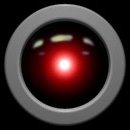Prance Like Nobody’s Watching

HEAD(hed), (n.) 1. the top part of the human body or the front part of an animal where the eyes, nose, east and mouth are. "Your brain is in your head."
DIBS(dibz), (n.) 2. a thick, sweet syrup made in countries of the East, especially the Middle East, from grape juice or dates. [Arabic "debs"]--World Book Dictionary, 1976.


That's ok, HAL. Thank you.
"The HAL 9000 computer - an artificial intelligence that could think, talk, see, feel, and occasionally go berserk - was supposed to be operational in January 1997. Has anyone seen HAL?
If you take 2001: A Space Odyssey literally, then right about now, somewhere in Urbana, Illinois, an intelligent machine is stumbling through a pathetic version of the song: "Daisy, Daisy, give me your answer, do...." January 12, 1997, is the birthday of HAL. Read the rest here.
Why do I bring this hunk of triviality to the fore this early in the morning? Because there is a level of significance and the more I think about it, the more I begin to wonder how technology is another Tower of Babel. I know, I sound like an old fundamentalist, but I have reasons to pursue these thoughts, as: 1) I have refined my enjoyment of science fiction and retain a certain level of interest in Clarke and Kubrick's "2001 Space Odyssey"; 2) am concerned about the nature, practice and experience of worship.
Arthur C. Clarke introduced some concepts way ahead of his time--so far ahead that he, along with Isaac Asimov have for years been consultants for those in the field of true science. Their contributions to NASA are many. But Clarke also gave us HAL (the name, it has been suggested, is actually his borrowing from IBM, as HAL is one letter removed). HAL exists in a fictional story that has certain levels of reality (I'll not take the time to expound on those here, but if you ask, I would direct you to the NASA websites for answers). The feature I focus on is Clarke's thourough removal of God from his system. This is evident from the beginning of "2001" and only in hinted at in the end. The full force of this system does not come to play until his book "2063", with a small mention in "2010" (one gets a flavor of it in the movie). In the literal sense, Clarke echoes Huxley by saying "FORD" instead of "LORD" or "God" in his books. To Huxley and his Brave New World, Henry Ford is made a benchmark for the rise of technological advances and achievements of humanity. In the automobile, man rises from the uttermost depths of worldly slime and evolves into a demigod. Clarke capitolizes on this.
Read once more the above statement from the movie, "2001 Space Odyssey". Notice how HAL introduces himself and where he was made fully functional. In Clarke's story, the H.A.L. plant was a branch of the Univeristy of Illinois, Urbana. Check this out under "1997". In 1998, Clarke was presented with the University of Illinois Presidential Award and Medallion for his numerous literary and scientific achievements and for the relationship he created with the university at Urbana-Champaign when he named it as the birthplace of HAL 9000, the spaceship computer in the novel and film "2001: A Space Odyssey."
For those in my closest circles, Urbana means "Missions Conference!" Perhaps the largest annual Missions conference in the world is held here just after Christmas every year. "But the University of Illinois is a secular school!" Yes. They have a thriving School of Computer Science and everything! I can't put the two together.
Why is this significant? Because the University of Illinois was not a secular school at it's founding and for many years thereafter. And Clarke knows this.
An amazing and revealing article called, "EDUCATING THE LORD’S REDEEMED AND ANOINTED: THE UNIVERSITY OF ILLINOIS CHAPEL EXPERIENCE 1868–1894" was printed in the Spring of 2000. This article traces the beginning of the school with its compulsory chapels to their demise and secularization of the school. What I see, of course, goes beyond the bounds of its author.
Is it a concidence that Clarke brought HAL into the world at this particular place in time? I don't think so. See, the university surrendered over to secularization in 1894. In 1891, Ford was an engineer with the Edison Illuminating Company in Detroit. He was promoted to Chief Engineer in 1893 was able to devote attention to his personal experiments on internal combustion engines. These experiments culminated in 1896 with the self-propelled vehicle-the Quadricycle.
I wonder if Clarke is trying to slap God in the face with birthday cake?
I need a stress pill.